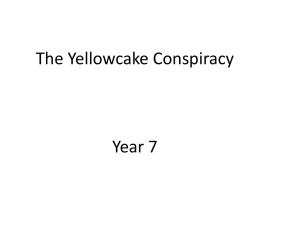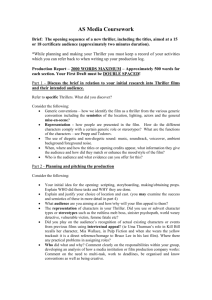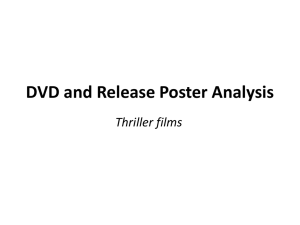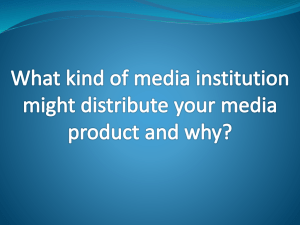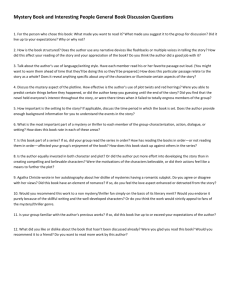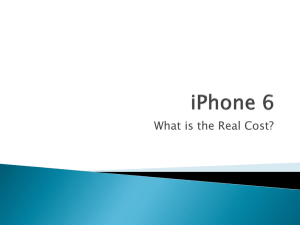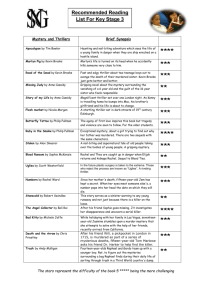The Thriller Genre * An overview
advertisement
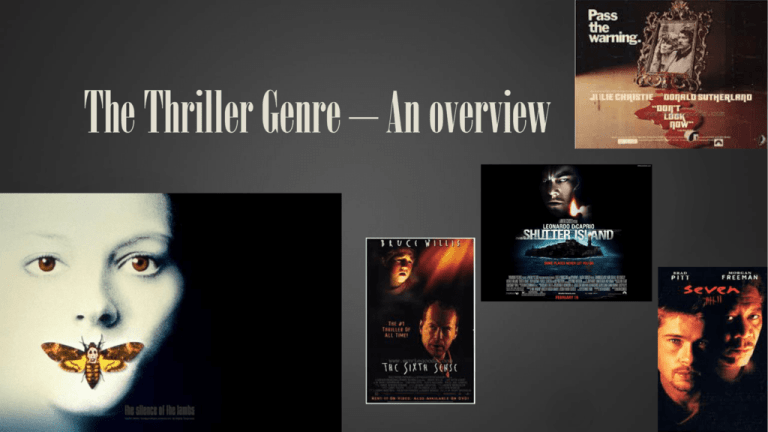
The Thriller Genre – An overview History Of the Thriller Genre People consider a film called ‘Safety Last’ by Fred Newman and Sam Taylor to be the first every thriller. It was made in 1923 and starred Harrold Lloyd. After this in 1927 Alfred Hitchcock made his first film ‘The Lodger’ which was based on the serial killer Jack the ripper. Thriller Hybrids and Subgenres There are many films that have some of the typical conventions of a thriller film but also have many others. These then fall into the category of sub-genre or hybrids. There are many types of thriller hybrids, some examples are: • Crime/detective thriller – e.g. ‘Now you see me’ • Action thriller – e.g. ‘The Bourne Identity’ • Disaster thriller – e.g. ‘The Impossible’ • Romance thriller – e.g. ‘Enduring Love’ Each of these does have the structure of a thriller but the way story runs and the different techniques used means that it can’t be placed firmly in the thriller genre. Narrative Themes & Conventions The biggest part of the thriller conventions is that extraordinary things happen to ordinary people. There’s always a note of peril in thriller, a lot of the time thriller deals with murderer’s, serial killers and kidnappers. Sometimes in a film as an audience member you get to see who the antagonist is, but a lot of the time in thriller you know as much as the protagonist and this is called a ‘Restrictive narrative’. Todorov theory of Narrative Todorov said that each story follows the same plot line which can be explained in 5 stages. 1. Equilibrium – The start of the film will show everything as it should be. So for example in Se7en it starts with Dct. Summerset and Mills just doing their job. 2. A disruption – The second part comes when something the harmony and normality of the first part. In Se7en this comes when they find the body of John Doe’s first victim. 3. Realisation – This is when everyone involved realises that there’s a problem. In Se7en this comes when all of the police force realise that the serial killer hasn’t finished killing and there will be another five murders. 4. Restored order – This is the part of the plot when everyone starts trying to change what happened. In Se7en this is when Summerset and Mills start working together well and they start doing better research into the killer. 5. Equilibrium again – This is where the problem is resolved and things can return to normality. In Se7en this is where John Doe is arrested. Vladimir Propp Propp was a Russian critic who worked in the 1920’s. He studied folk tales and realised that in every story eight characters recur throughout history, these are; 1. The Hero – A character that seeks something. In Se7en this would be Dct. Summerset. 2. The Villain – someone who tries to stop the hero. In Se7en this would be John Doe 3. The Donor – Someone who provides something to help the hero. In Se7en this would be the man who gives Summerset the information about who had read a certain list of books which leads him to the villain. 4. The Dispatcher – The person who sends the hero on his/her quest via a message. In Se7en this is the chief of police. 5. The False Hero – A character that disrupts the hero with false information 6. The Helper – Someone who’s helping the hero. In Se7en this is Dct. Mills, although he could also be classes as the hero, but Summerset is older than him so it makes you think that he must be the helper rather than hero. 7. The Princesses – Acts as reward for the hero and an object for the villain. In Se7en this would be Mills’ wife. 8. The father – Rewards the hero for saving the princesses. Typical Thriller Characters HERO (Protagonist) The hero in a thriller is generally an ordinary person or someone who works in law enforcement. Despite the fact that the hero is the ‘good guy’, he/she always has a flaw. For example in ‘Shutter Island’ (although you don’t find out till near the end of the film) The main character Teddy Daniels, is actually crazy. And in ‘Taxi Driver’, the character Max, is driven by money. VILLIAN (Antagonist) Although the villain is obviously never someone who is at all nice. They are nearly always someone who’s very clever and manages to stay one step ahead of the protagonist. They usually have a motive as to why they’re doing whatever it is. For example, in ‘Se7en’ John Doe thinks he’s doing the right thing because he’s ‘ridding people of sin’ DAMSELL The damsel in distress is usually the hero’s girlfriend or wife. They are nearly the villains final victim that get saved at the last second. Of course there are a lot of plot twists in thrillers so for example in ‘Se7en’ Mills’ wife is the last victim but they do not manage to save her. Mis-En-Scene Mis-en-scene is a French word which means ‘Placing on stage’ and it is everything that you can see in the frame of a film • Colour/lighting – A lot a blue lighting is used in thriller to show that the place is cold and unwelcoming. • Sound – Obviously each film has a soundtrack and the soundtrack always should reflect the feel of the film. So in thrillers a lot of the sound tracks are big orchestral pieces. • Setting/location – The idea behind thrillers is that extraordinary things happen to ordinary people, so the settings are usually in an ordinary place like the centre of a town, but some where that is very unpleasant and unwelcoming, like a dark alley. • Costume & make up – this is used to tell you about each of the characters without saying things outright. So the way a character is dressed could tell you they’re a messy person without it actually being said at any point in the film. Editing Editing – The pace at which a film is edited changes due to what kind of film it is. In thrillers when the film is drawing to a close the pace becomes faster to suggest an urgency. It’s generally fairly fast paced and sharp throughout the film in order to show that what’s happening is something dangerous. Target Audiences & Audience Expectations The target audience for thriller can vary from teenagers up. Depending on whether the thriller the audience are going to see is a straight thriller or a subgenre thriller e.g. Crime thriller, their expectations can vary. The things I personally expect when I go to watch a thriller is, suspense, crime and overall for it to be a thrilling experience which is what it’s supposed to be, hence the name of thriller. Initial Ideas for my own Opening Title Sequence After watching a number of different thrillers and thinking about the sort of thing I would want for my opening title sequence, I’ve realised that I want it to be something fairly obscure. What I thought was we could have an actor standing in a run down building dressed quite formally. He would be staring at the wall (But the audience wouldn’t see what it was he was staring at). It would cut to an extreme close up of his hand which would have a very small amount of blood on them, this gives the audience reason enough to believe that he’s the villain but have no idea what it is he’s done which creates suspense. There will be suspenseful music in the background which will help add to the idea of the man in frame is a villain . Cinematography Thriller films use a large verity of shots, but a lot of the time no establishing shot is used because it adds mystery. In wide angle shots the subject takes up the majority of the frame with a little safety room to either side also above and below it. Long shots are used in the same way as wide angle shots, showing the full subject with space around. A point of view shot or POV is where you’re looking through the subjects eyes. Thrillers use POV shots quite a lot because it holds information from the viewer and only shows you what one character is seeing. Close ups are used because it shows a small part of a scene but in great detail. Thrillers also often use high angle shots so it’s as though you’re looking over the characters shoulder. This is often used while a character is either writing or reading something. Source List http://www.tiki-toki.com/timeline/entry/69797/History-of-the-Thrillergenre/#vars!date=1928-11-13_13:42:14! http://www.filmsite.org/subgenres.html Pictures Used 1. The Silence Of the Lambs (1988) 2. Se7en (1996) 3. The Sixth Sense (1999) 4. Shutter Island (2010) 5. Don’t Look Now (1973) 6. Safety Last (1923) 7. The Bourne Identity (2002) 8. Shaun of the Dead (2004) 9. Now you see me (2013) 10. Shutter Island (2010)

